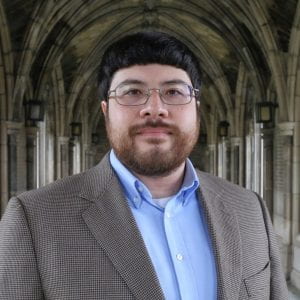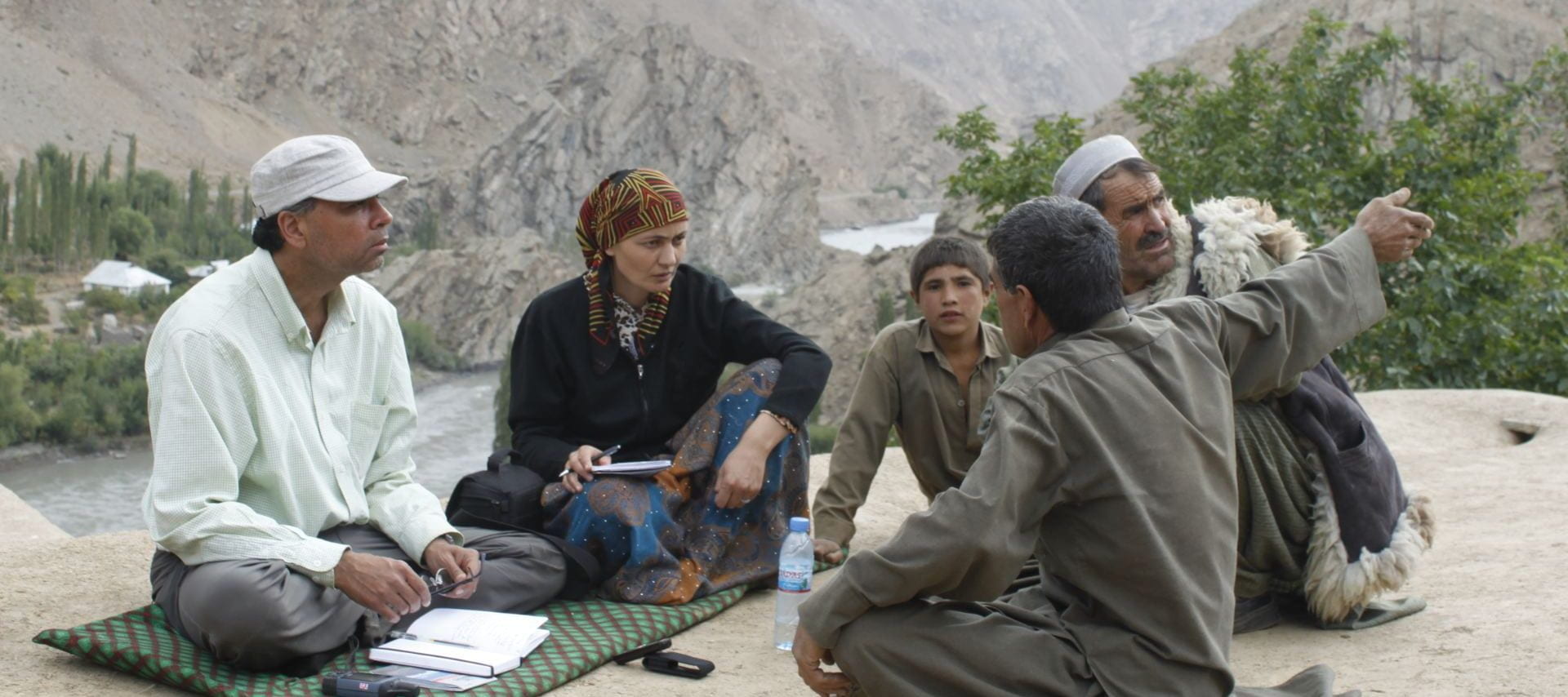
Photo credit: Umed Bulbulshoev
Our research group conducts human ecological research in partnership with indigenous peoples and local communities. We seek to innovate policy and practice in civil society by re-envisioning paradigms that are failing. Our current research efforts coalesce around areas of high altitude and latitude where ecological and socio-cultural change are critically affecting food, health, energy, and water sovereignty. Through participatory research, we incorporate qualitative and quantitative techniques from the social and biophysical sciences as well as the humanities. We take a pluralistic approach, recognizing that effective solutions are based on multiple epistemological paradigms. We assert that indigenous knowledge helps to conserve biocultural diversity in ways that are beyond the reach of single-disciplinary approaches. By supporting communities as they anticipate and respond to change, we engage complex ethical and policy challenges of the 21st century.
Visiting Scholar
 |
Dr. Noor Ahmad Akhundzadah is a Visiting Scholar and Institute of International Education’s Scholar Rescue Fund Fellow. Noor Ahmad holds a Ph.D. in Hydrology from Tokyo University of Agriculture and Technology in Japan. He has a significant research record and has served as Dean of the Faculty of Environment at Kabul University. The overwhelming challenge for Afghanistan is the climate crisis. Conflict, migration, food insecurity, the continuing deterioration on the role of women, and terror, can be traced back to and will be exacerbated by the climate crisis. In Afghanistan, a mountainous country, water is connected to everything, food security, energy, economic development, and health. Afghanistan will achieve stability; the Taliban cannot sustain a government of terror. Through the fellowship Noor Ahmad will work with us in the Department of Natural Resources and the Environment and across Cornell to address these contemporary challenges. |
Graduate Students
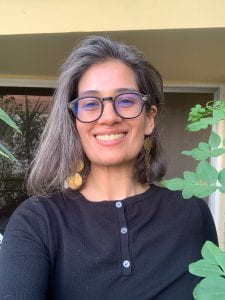 |
Advisor of Tabindah Anwar, a Masters in Professional Studies student in Global Development at Cornell University. Ms. Anwar has received a Fulbright Fellowship for her studies at Cornell. She is studying how Indigenous and local communities in Mountainous regions are adapting to climate change and stewarding their ecosystems.
Ms. Anwar has over seven years of experience in the development world, including working with the United Nations Development Programme (UNDP) in Pakistan, where she led UNDP’s Flood Response Communications Strategy after the 2022 floods in Pakistan, along with providing on-ground communications support for the International Conference on Climate Resilient Pakistan in Geneva. Through her work at UNDP, she has voiced climate concerns of local communities in Pakistan, and also worked on documenting Indigenous and local solutions to climate change and environmental challenges |
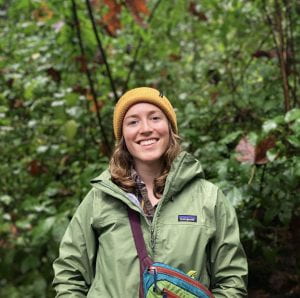 |
Advisor of Phoebe Wagner, an MPS student in Global Development and a Foreign Language and Area Studies (FLAS) Fellow in Hindi. Phoebe seeks to address land sovereignty through sociocultural and ecological systems approach, with plans to conduct her participatory research at Bija Vidyapeeth in Dehradun, India. Phoebe holds a Bachelor of Arts in Sociocultural Anthropology and History from Willamette University, with focuses on Indigenous studies and immigration. For her undergraduate honors thesis, she conducted qualitative research with immigration social service providers and wrote “Humanitarianism in a Neoliberal Age: Refugee Services in Salem, Oregon.” While working at the Immigrant and Refugee Community Organization, she conducted research on the health benefits of community gardening in immigrant and refugee services. Both projects were presented at Society for Applied Anthropology annual conferences. She calls Portland, Oregon home. |
Undergraduate Students
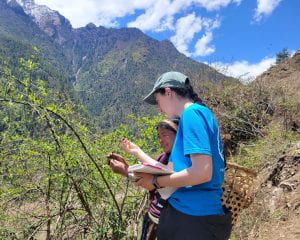 |
Advisor of Ashira Weinreich, College Scholar Honors Student at Cornell University. Her thesis will examine parallels among varying ethnic and cultural groups’ healing practices and beliefs. Ashira’s case study in the Himalayas of Nepal will explore the role of biocultural diversity on health and specifically, how medicinal plant knowledge contributes to health sovereignty in times of cultural and environmental change. Diverse biological, cultural, geographic, political, and religious systems shape and inform her aspirations as a health scholar and practitioner. |
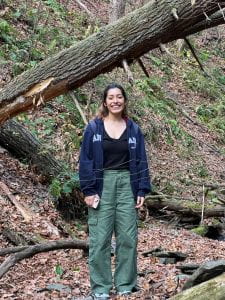 |
Advisor of Emileen Flores, third-year Plant Sciences Major with a concentration in Plants and People and minors in Education and LGBTQ+ Studies. Her thesis will focus on the curation of interpretive plant displays at the Cornell Botanic Gardens to celebrate and honor Indigenous communities. She hopes to continue learning about the ways plants and people sustain one another in a rapidly changing environment. Her academic interests include medicinal plants, Indigenous knowledge, science outreach, and queerness and the environment. |
Einaudi Fellows |
|
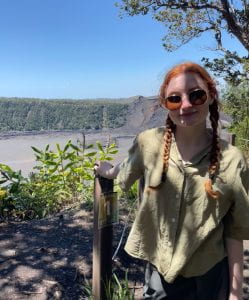 |
Mentor of Mira DeGregory, Mario Einaudi Global Scholar and second-year student in Global Development. Mira’s research capstone for Cornell’s Global Free Speech Symposium will cross-compare Uyghur and Tibetan environmental expression as resistance to the oppressive Republic of China. Her findings will compile historical artifacts of spiritual ecology in the Himalayan and Xinjiang mountain regions to juxtapose indigenous stewardship against land dispossession, ethnic cleansing, and place-based knowledge suppression. |
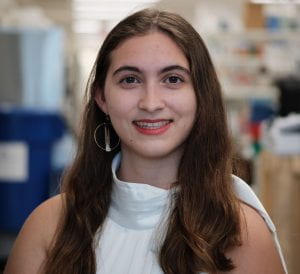 |
Mentor of Peyton DiSiena, Einaudi Global Scholar and Hunter R. Rawlings III Presidential Research Scholar at Cornell University. She is a current third-year student studying biological sciences, concentrating in genetics, genomics, and development, with minors in anthropology and American Indian and Indigenous studies. Her project is on freedom of expression among Indigenous nations, primarily the Gayogo̱hó:nǫˀ, in hopes of combining poetry, visual artwork, personal narratives, and interviews into an anthology spanning various topics including identity, language, environmental justice, and sovereignty. This work will shed light on contemporary Indigenous voices spanning various ages, perspectives, and lived experiences. In the future, she hopes to pursue a career as a physician-scientist, with an interest in medical genetics and Native American and rural health. |
 |
Mentor of Nessa Sandoval, Einaudi Global Scholar and second-year student pursuing a double major in Environment and Sustainability and Anthropology at Cornell. She is also working towards a triple minor in Latino Studies, Latin American & Caribbean Studies, and American Indian Indigenous Studies. Nessa’s project will address the disparities in the water crisis affecting Indigenous communities in Bolivia. Nessa’s undergraduate experience has involved being a 2023 Nexus Scholar researching fish isotopes and their correlation to climate change, field-work alongside Indigenous Shuar communities in Ecuador, and a Rare and Distinct Language Fellowship for the Quechua Language. Her academic interests revolve around the intrinsic significance of environmental studies with a nuanced understanding of the cultural dimensions. |
Graduate Research Assistant
 |
Maria De Lourdes Orozco Ramirez, a Graduate Research Assistant to Professor Kassam is pursuing a Master’s of Professional Studies in Global Development. Her academic focus includes international agriculture, education, and communication with a dedication to bridging knowledge gaps and advocating for just and equitable food systems. Her research will center on enhancing dragon fruit (pitahaya) research by weaving in participatory mapping to empower Indigenous and local communities in recognizing socio-cultural and ecological wisdom. This research will be conducted in partnership with Kenyan and Mexican growers. Maria holds a Bachelor of Science from UC Davis in Sustainable Agriculture and Food Systems, with a focus on Latino and Chicano studies as well as Community and Regional Development. |
Undergraduate Research Assistant
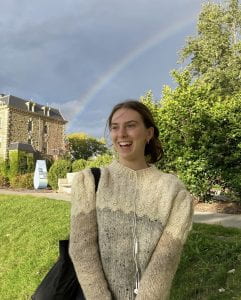 |
Claire Schmucker, an Undergraduate Research Assistant to Professor Kassam, is currently a fourth-year student in the Environment and Sustainability program at Cornell. Her area of concentration is Evolutionary Biology and Applied Ecology with a minor in Climate Change. Claire’s undergraduate research has involved a range of projects including a field survey of morphological plant adaptations to climate and geography in Argentina; cataloging botanical specimens in the L.H. Bailey Hortorium Herbarium; forest ecology inventory; imaging of Eastern North American tree buds; and serving as a teaching assistant for Professor Kassam’s Ways of Knowing: Indigenous and Place-Based Ecological Knowledge course. Her academic and professional interests lie at the intersections of biodiversity of plants and people. Her future plans in ecology involve study of the relationship between people and their natural environments and food systems, with specific attention to the effects of climate change on mountainous and coastal communities. |
Past Graduate Students
- Advisor of Omisha Manglani (MS, 2023): Omisha’s graduate research explores the implications of a context-specific educational initiative on health sovereignty and environmental justice in Spiti Valley, India.
- Advisor of Daler Kaziev (MS, 2021): Daler worked for several field seasons as a part of the Ecological Calendars and Climate Adaptation in the Pamirs (ECCAP) team of researchers to develop an ecological calendar for Sary Mogul in the Alai Valley, Kyrgyzstan.
- Advisor of Leo V. Louis (MS, 2021): As part of the Ecological Calendars and Climate Adaptation in the Pamirs (ECCAP) project, Leo analyzed interviews to develop an ecological calendar for Oneida Lake Watershed.
- Advisor of Michael Dunaway (PhD, 2020): Michael’s research focus is on Indigenous Energy Sovereignty. His dissertation focused on creating a tool to assess the technological appropriateness of renewable energy technologies on Native American Reservations. Michael is a member of the Choctaw Nation of Oklahoma and as such has committed to working with diverse communities in his future research as well as promoting diversity and inclusion in his field.
- Advisor of Abraham Francis (MS, 2019): Abraham worked on applied research to develop a biocultural land stewardship strategy for existing and newly settled Native American Land Claims on the St. Regis Mohawk Reservation, Akwesasne. His research interests included health, education and cultural foundations as a means to empower Indigenous Communities. Abraham has a BS in Microbiology from Cornell. His past experiences include community empowerment, engagement and research with the Mohawk Council of Akwesasne. He is currently the Environmental Services Manager for the Mohawk Council of Akwesasne – Environment Program, which is the oldest First Nation environment agency in Canada.
- Advisor of Yerlan Issimov (MS, 2019): Yerlan had international experience in transportation and logistics for businesses in Central Asia. His research interests were in developing policies and strategies for Kazakhstan in the framework of a Trans-Eurasian trade network. This research highlighted the potential opportunities for maximizing the economic benefit from the Eurasian Land Bridge or the New Silk Road, and the Indian analog of the New Silk road called “North-South”. His research covered: revitalizing the concept of the Silk Road, evaluating the best traditions of the historic Silk Road before colonization, investigating the commodity exchange of Astana International Finance Center territory, digitalizing business-processes and usage of large-scale data, examining the Indian trade way project called “North-South” as a counterbalance to the Chinese Silk Road project, and examining infrastructure needs of cities and villages for a revitalized Silk Road.
- Advisor of Laura Simmons-Stern (MPS, 2019): Laura’s research interests were in community-based approaches to climate change mitigation and adaptation, as well as rural sustainable development strategies. Laura received her undergraduate degree in Environmental Studies with a certificate in Community Action and Public Policy from Connecticut College. She has since worked with organizations in rural Zambia, Ghana, and Uganda, served as a Peace Corps Volunteer in Mexico, as a Peace Corps Trainer in Timor-Leste, and with an international sustainability consulting firm in Boston.
- Advisor of Elle Nevers (MPS, 2018): Elle (Ellen) studied International Agriculture and Rural Development in the MPS Global Development program. Her Masters Project Paper was on Reconceptualizing Waste as a Resource at Cornell University. She holds a BA in Chinese Language and Literature and a BA in French Studies from Boston University. Elle plans to use her language background to research and connect with isolated farming communities in East Asia.
- Advisor of Kayla Scheimreif (MS, 2018): Kayla’s MS research was on based the Ecological Calendars and Climate Adaptation in the Pamirs (ECCAP) project in Central Asia.
- Advisor of Talia Chorover (MS, 2018): Talia’s MS research was based on the Ecological Calendars and Climate Adaptation in the Pamirs (ECCAP) project in Central Asia.
- Advisor of Murodbek Laldjebaev (PhD, 2017): Murodbek is interested in energy security and energy sovereignty in the context of Tajikistan. His dissertation explored energy security, poverty, and sovereignty in mountain communities of Tajikistan.
- Advisor of Michelangelo Lieberman (MPS, 2016): Michelangelo’s research examined the relationship between child beggars (talibé) and their teachers (marabouts) in Saint Louis, Senegal, work which he began as a Peace Corps Volunteer from 2011 to 2013.
- Advisor of Chuan Liao (MS, 2012; PhD, 2015): Chuan’s research integrated natural and social sciences to address the use of common-pool resources, to demystify “the tragedy of the commons”. He conducted research with pastoral communities in in Borana, Ethiopia, and in the Central Asian steppe of Xinjiang, China.
- Advisor of Morgan Ruelle (MS, 2011; PhD, 2015): Morgan’s MS research was conducted with Dakota and Lakota elders in the Standing Rock Nation and focused on seasonal availability of plants, knowledge transmission, and local farmers markets. His dissertation research was conducted with subsistence farmers in Ethiopia to understand the contribution of plant diversity the food systems, as well as their seasonal availability, spatial distribution, and significance within sacred sites.
- Advisor of Michelle Baumflek (PhD, 2015): Michelle’s research focuses on interconnections between plants and people. She is interested in the role wild plants can play in issues of health sovereignty and cultural identity. Michelle completed a two year study of contemporary use and changing access to gathered plants in Maine. Her PhD research was a continuation of this work. In collaboration with two Native American tribes in northern Maine, Michelle developed culturally-appropriate management plans for wild plants which take social and ecological factors into account.
- Advisor of Rajeev Goyal (MPS, 2015): Rajeev’s research focused on strategies for countering the effects of land fragmentation in eastern Nepal. Secondary to the expansion of road infrastructure in the rural hills, land prices have escalated, causing the conversion of diverse habitats into building sprawl. Rajeev examined how a network of government schools in the eastern hills can serve as a land trust for biodiversity education.
- Advisor of Jeffrey Wall (MPS, 2012; MS, 2014): Jeffrey conducts farmer-centered research that examines agricultural ecology, biocultural diversity, crop genetic resource conservation and food insecurity. Jeffrey’s Master of Professional Studies research, conducted in tandem with his Peace Corps service, evaluated the cultural and financial importance of chestnut production in two villages in Azerbaijan, where the recent arrival of chestnut blight (Cryphonectria parasitica) threatens significant damage. For his MS thesis, he built on this work to conduct a social and biological impact assessment for the biological control of chestnut blight across Azerbaijan.
- Advisor of Nicole Wilson (MS, 2012): Nicole’s Master’s thesis is entitled, Human Ecological Dimensions of Change in the Yukon River Basin: A Case Study of the Koyukon Athabaskan Village of Ruby, AK. In collaboration with the Yukon River Inter-tribal Watershed Council, her research examines the implications of climate change for the subsistence livelihoods of Alaska Native Tribes and First Nations in the Yukon River Basin, including the role of indigenous knowledge and institutions in facilitating adaptation to change.
- Supervised Robert A. Hawkesworth, Master of Arts (MA, 2003), Thesis Topic: Evaluating Community Participation in an Action Plan to Decrease Homelessness in Calgary, the Resources and the Environment Program, Faculty of Graduate Studies, University of Calgary. Calgary Alderman Bob Hawkesworth successfully completed his dissertation and defense evaluating the most adequate methods to promote participation by all stakeholders in reducing homelessness in the city of Calgary.
- Supervised Darwin Peter Bateyko, Master’s Degree Project (MDP, 2003), Thesis Topic: Evaluating Co-Management: A Framework for Analysis, Faculty of Environmental Design, University of Calgary. Mr. Bateyko examined the role of co-management of natural resources in aboriginal northern communities as a result of Land Claim Agreements. Undertaken in partnership with Sahtu Renewable Resources Board, this research is intended to have real and practical impact on the governance structures of the Sahtu Land Claim Agreement.
- Committee Member/Examiner of Jennifer McKillop, Master’s Degree Project (MDP, 2002), Thesis Topic: An Approach to Land Management and Development: Assessment for Fort McKay First Nation, Faculty of Environmental Design, University of Calgary. Professor Kassam’s responsibilities involved assignment of readings and engaging the student in critical discussion. Time was spent concentrating on methods used for collecting indigenous knowledge and methodology for aboriginal community participation in research.
- Committee Member/Examiner for Frederick McDonald, Masters of Fine Arts (MFA, 2002), Topic: Ancestral Portraits, Faculty of Fine Arts, University of Calgary. Mr. Frederick McDonald is a Native Cree artist from Northern Alberta. Professor Kassam’s contribution included assisting Mr. McDonald in asking questions such as: what is the role of representation in art, how does art challenge stereotypes and cultural imperialism, and what is the role of cultural identity in art? Frederick McDonald successfully defended his dissertation and exhibition at the Banff Centre Gallery. The dissertation he wrote became a book published by the University of Calgary Press to which Professor Kassam wrote the introductory preface.
- Mentored Sean K. Maher, Murray Fraser Graduate Research Assistant to the Murray Fraser Professor of Community Economic Development (1998-2000). Professor Kassam assisted Mr. Maher in his studies and worked with him in developing his research and teaching profile. Mr. Maher contributed to Professor Kassam’s various research projects. He is currently completing his doctorate at the University of Cambridge, UK.
Past Post Docs and Visiting Fellows
- Advisor of Cara Steger, Post-Doctoral Fellow at the Department of Natural Resources and Environment, Cornell (2021): Dr. Steger is a human-environment geographer with a regional specialization in Sub-Saharan Africa and technical expertise in geospatial technologies, social-ecological modeling, and collaborative approaches to environmental governance. Her research uses both qualitative and quantitative models to facilitate learning among diverse groups of stakeholders for improved environmental management outcomes. As a current NSF SPRF fellow, Dr. Steger has returned to Senegal to co-produce a holistic understanding of environmental change with stakeholders living in and around Niokolo-Koba National Park.
- Advisor of Mohamed Abdou, Visiting Fellow at the Einaudi Center Racial Justice Program (2021): Dr. Abdou is an interdisciplinary scholar of Indigenous, Black, critical race, and Islamic studies, as well as gender, sexuality, women’s studies, and decolonization with extensive fieldwork experience in Middle East-North Africa and Turtle Island. He is the author of the forthcoming book Islam and Anarchism: Relationships and Resonances (Pluto Press, 2022). His latest project examines how spiritual orientations/practices can inform non-racial conceptualizations of indigeneity and troubles contemporary decolonial social movements that are animated by secular anti-global and anti-Capitalist aspirations.
- Advisor of Tuguldur Ekhtsetseg, Visiting Fellow at Cornell (Fall 2018) Humphrey Fellow: Tuguldur is from Mongolia where he has been a field biologist for The Nature Conservancy since 2009. He continues to work to expand effective conservation efforts in protected areas in Mongolia. Tuguldur graduated from the Mongolian State University of Education. His MS thesis was on Ecology of the Siberian Ibex in Ikh Nart Nature Reserve in Mongolia. His research interest was community based conservation, community participation in policy decision making or co-management, wildlife monitoring, park management and climate change in grassland ecosystems.
- Supervisor of Morgan Ruelle, Visiting Fellow at Cornell (Fall 2010) PhD: Morgan’s research is focused on the use of ecological calendars to anticipate climate trends and variability. He is working to document traditional ecological calendars and other phenological knowledge, identify reliable seasonal cues that correlate with both weather and livelihood activities, and initiate community-based phenological monitoring. He will be leading field work in the Standing Rock Nation as well as communities surrounding Oneida Lake in New York.
- Supervisor of Aziz Ali, Visiting Fellow at Cornell (Fall 2010) PhD: Aziz Ali has 25 years of professional experiences in Rural Development and in Strategic and Participatory Planning, with a special focus on food security and livelihoods improvement. His work in natural resource management has included projects in agriculture, forestry, rangelands/livestock, and water resources. Much of the time, Aziz has employed participatory approaches that help to empower local communities. Aziz also has conducted research on the above themes in Pakistan, Afghanistan, and the Pamir region of Tajikistan − providing him much first-hand experience with rural mountain communities. Recently, Aziz was awarded the prestigious South Asia Fellowship 2018 from Cornell University for his work on “Vulnerability and Disaster Risk Assessment in the Emerging Scenario of Climate Change in North-Eastern Afghanistan.” Aziz holds a Professional Master Degree in Natural Resources Management from International Institute for Aerospace, Survey and Earth Science in the Netherlands, and an MSc in Botany and Forestry from Peshawar University, Pakistan. Currently, Mr. Ali is pursuing his PhD degree at Philipps Universität, in Marburg, Germany.
- Advisor of Umed Bulbulshoev, Visiting Fellow at Cornell (Fall 2010): Umed is a linguist who studies the interconnections between language, culture and human ecology. He believes that as indigenous languages are lost, knowledge related to the preservation of biodiversity and adaptation to change are lost as well. Umed’s research focuses on Pamiri languages spoken in the mountainous Badakshan region of Tajikistan and Afghanistan including Shugnani, Rushani, Ishkashimi, and Wakhani. Umed co-wrote a paper about indigenous calendars entitled, Ecology of Time: Calendar of the Human Body in the Pamir Mountains.
- Advisor of Munira Karamkhudoeva, Visiting Fellow at Cornell (Spring 2010): Munira is an entomologist who works in the Pamir Mountains of Afghanistan and Tajikistan. Her current work focuses on medicinal plants and plant diseases, and involves social as well as biological components. A member of the Pamir Biological Institute, Munira has previously researched whiteflies associated with failing potato harvests in Afghanistan. Munira co-wrote a paper about the importance of medicinal plants in the Pamir Mountains entitled, Medicinal Plant Use and Health Sovereignty: Findings from the Tajik and Afghan Pamirs.
Past Undergraduate Honours Students
- Advisor of Omisha Manglani, undergraduate student: Omisha is an undergraduate student, double majoring in Environmental and Sustainability, and International Agriculture and Rural Development. In Spring 2019, she began her independent research with Professor Kassam; looking into the sustainability of lifestyles in Spiti Valley, a remote region of the Biosphere Reserve of the Trans Himalayas. She is investigating the peoples’ dependence on wild foods, indigenous medicinal knowledge systems, and the inclusion of local knowledge in educational institutions. Omisha aims to reframe context-specific educational initiatives that nurture, rather than threaten, indigenous cultural diversity.
- Advisor of Anna Ullmann, Honours Student at Cornell University/Research assistant: Anna majored in Environmental and Sustainability Sciences and minored in Climate Change. She consolidated her passion for wildlife conservation as well as her interest in working with communities to formulate her thesis. She worked collaboratively with Professor Kassam’s research group in the Roshorv and Savnob villages of Tajikistan. Anna investigated the impact of climate change on key indicator species and livelihood species in the context of Ecological Calendars (graduated 2020).
- Advisor of Iriel Edwards, Honours Student at Cornell University/Research assistant: Iriel Edwards doubled majored Environmental and Sustainability Sciences and Entomology. She began her work with Professor Kassam in the Spring of 2018 as his research assistant. Her thesis investigated wild foods and their contribution to food security in the Oneida Lake Watershed of Upstate New York (graduated 2019).
- Advisor of Madeline Rich: Honours Student at Cornell University. She majored in General Biology with a concentration in Marine Biology. Her thesis project synthesized place-based knowledge from communities around the Oneida Lake Watershed of New York, with the ultimate goal of creating an ecological calendar to build resiliency against climate change. Her past experiences include studies in biomechanics, taxonomy, and developmental biology (graduated 2018).
- Supervised Tamar Law, Honours Student at Cornell University. Her senior honor’s thesis entitled ‘Hive Mind’ examined the biocultural status of beekeeping in Mankara, Madagascar. Ms. Law was a College Scholar, majoring in Feminist Gender and Sexuality Studies with a minor in French and Anthropology (graduated 2017).
- Supervised Anna Brown, Honours Student at Cornell University. Her senior honors thesis examined indigenous knowledge systems and community-based resource management in the mountain village of Nepal. Ms. Brown was a double major in Development Sociology and South Asian Studies (graduated 2016).
- Supervised Kelsey Poljacik, Honours Student at Cornell University. Her senior honors thesis focused on co-management of natural resources in Tanzania and Canada. Ms. Poljacik majored Natural Resources with a minor in Law and Society (graduated 2016).
- Supervised Sherry Martin, Honours Student at Cornell University. Thesis Topic: Indigenous Knowledge for Conservation of Natural and Cultural Resources: A Case Study in the Wet Tropics World Heritage Area of Far North Queensland. Ms. Martin was a double major in Biology & Society and Natural Resources (graduated 2011).
- Supervised Tara Collins, Honours Student at the University of Calgary. Her thesis examined how renewable energy opportunities have been transformed and adapted in Canadian communities, and how these processes may be useful for other remote communities in crisis, including the Pamir Mountains of Tajikistan. Ms. Collins majored in Development Studies (graduated 2007).
- Supervised May Mah, Honours Student at the University of Calgary. Thesis Topic: Canadian Development Assistance and Human Rights in China. Ms. Mah’s research evaluated development assistance by the Canadian International Development Agency (CIDA) and its stated policy towards human rights in China. Ms. Mah majored in Development Studies (graduated 2003).
Past Research Assistants
- Aishwarya Shankar, a Graduate Research Assistant for Professor Kassam, graduated from Cornell’s Master of Landscape Architecture program in 2023. Aishwarya has been practicing architecture in India since 2016 working in collaboration with sustainable traditional Indian craftsmanship. By double minoring in Peace Studies and Indigenous Studies, her focus within landscape architecture lies towards participatory action research, bio-cultural diversity, archaeology and transdisciplinary design research. Her Master’s Thesis entitled “From Wasteland to Biocultural Heritage: Negotiation by Design in Khotale, Konkan, India” explores the potential of traditional knowledge systems in climate change conflict zones through stewardship and environmental-social justice.
- Billie Koffman, an Identities, Inequalities and Justice Research Assistant to Professor Kassam, graduated from the Department of Government at Cornell University in 2023. Her interests include public and environmental policy and international relations. Outside of school she was the president of the Cornell International Affairs Review and the vice president of No Rules – an Intersectional Feminist Publication.
- Kania Thea Pradipta, a Graduate Research Assistant to Professor Kassam, graduated from Cornell’s Master of Regional Planning program in 2021. Her interests include economic and community-based development in parallel to environmental planning and climate change adaptation to achieve more sustainable and resilient communities. Her final research paper analyses the socio-economic impact of eco-tourism planning on Indigenous and local community in Labuan Bajo, Indonesia.
- Hayley Tessler, Research Assistant to Professor Kassam, graduated with major in Environment and Sustainability, and minor in Inequality Studies at Cornell University, undertook research on Food Security and the Sacred at Oneida Lake in 2021.
- Alexandra Mantilla, undergraduate intern and student: undertook ecological calendars research at Oneida Lake Watershed in 2021.
- Anna Ullmann, Research Assistant to Professor Kassam, graduated in Environment and Sustainability Sciences in December 2020.
- Iriel Edwards graduated with honours from Cornell University with a double major in Environmental and Sustainability Sciences and Entomology in 2019. She began her work with Professor Kassam in the Spring of 2018 as his research assistant. Her thesis investigated wild foods and their contribution to food security in the Oneida Lake Watershed of Upstate New York.
- Phoenix Storm Paz graduated Magna Cum Laude from Cornell University in 2012, with a double major in History and Spanish and a triple minor in American Indian Studies, Latin American Studies and Latino Studies. Her thesis analyzed the creation of national and ethnic identity in Gold Rush California by examining life and times of California bandit Tiburcio Vasquez, whose criminal career stretched from 1852 to 1875. An Undergraduate Mellon Mays Fellow while at Cornell, she wrote a second thesis about the performance of authenticity in the Ayahuasca Tea Ceremony and the reformulation of ethnic identity for cultural tourism by indigenous Quechua Peruvians. In July 2013, Phoenix graduated from University of Oxford in the United Kingdom with a Masters of Science in Migration Studies. Her dissertation discussed the performance of identity and the gap between local belonging and national authenticity, focusing on the interaction between immigrant Bangladeshi and Senegalese street hawkers and international holidaymakers in Rome and Naples, Italy. Currently, Phoenix is preparing to move to Tel Aviv, Israel for six months to work with African refugees.
- In the Summer of 2006 Lesley Campbell, Tara Collins, Jeffery Halvorsen and Heath McLeod joined Professor Kassam on the following projects:
- Social Impact Assessment of a resource development project. The project explored the impact on First Nation and non-First Nation communities in Yukon and northern British Columbia.
- Project planning trip to Afghanistan and Tajikistan to look study the link between biological and cultural diversity
- Publishing an edited book with the title: ‘Understanding Terror: Canadian Perspectives’
- Lesley Campbell is completing an after degree program majoring in Development Studies. She holds a double major in Anthropology and History from the University of New Brunswick. Her research interests include climate change and the role of social action in increasing public awareness (2006).
- Tara Collins completed her Bachelor of Arts in Development Studies (Honours) at the University of Calgary. Her research interests include collaborative community planning, renewable energy, green building and issues of social equity and diversity. In 2005, she spent four months in Zambia working with subsistence farmers on conservation farming, micro-irrigation and market access.
- Jeffery Halvorsen completed his Bachelor of Arts in Development Studies (Honours) at the University of Calgary. His research interests include the role of journalism in democracy and the role of stakeholder theory in creating relationships between corporations and NGOs to form a socially conscious private sector (2006).
- Heath McLeod holds a Bachelor of Arts in Development Studies with a minor in History from the University of Calgary. His research interests include the use of satire for increasing awareness of social issues. He was awarded a Canadian International Development Agency (CIDA) internship with Mines Action in The Republic of Georgia (2006).
Listed below are internship projects of Professor Kassam’s Northern Planning and Development Studies Students (NPDS) which were geared to integrate their Major with the NPDS programme:
- Supervised Individual Internship Project (NPDS 500) for Renita Schuh (BA Canadian Studies). Renita Schuh’s work involved establishing an organization structure for a local NGO based at Kenya University to find professional and experiential learning opportunities for African students (2003).
- Supervised Group Project Internship (NPDS 400) for Tavis Baubier (BA Development Studies). Tavis Baubier worked with the Government of Northwest Territories. His role was to review the process of negotiating the devolution of natural resources and environment programs from the Federal Government to the Yukon Government. Then undertake an analysis of the Yukon devolution experience and identify key issues and lessons learned. He subsequently reported these findings to the Government of the Northwest Territories. His work contributed to policy formulation in the North (2002).
- Supervised Individual Internship Project (NPDS 500) entitled “Tlicho Ko – Dogrib House” for Ouri Scott (General BA with Minor in Architecture). Ms. Scott prepared an architectural design for building a meeting place for the Dogrib First Nations Government in Rae Edzo, Northwest Territories in anticipation of the ratification of the Dogrib self-government agreement with the Federal government (which occurred in 2004). She successfully presented her design to a committee consisting of two professors of architecture (Dr. Lee and Dr. Hamel from the Faculty of Environmental Design), a professor of urban studies (Dr. Felske), and two professors of native and heritage studies (Dr. Devine and Dr. Wetherell) (2002).
- Supervised Group Project Internship (NPDS 400) for Stephanie Sanders (BA Distinction, Geography) and Adam Gagnon (BA Geography). Ms. Sanders and Mr. Gagnon raised $16,000 and undertook a Youth Conference entitled Bridging the Gaps: The Role of Youth in Sustainability. 120 University and senior level High School Students attended the three-day conference at a campsite. Representatives of the Government, private sector, academic and NGO institutions participated and made presentations (2001).
- Supervised Group Project Internship (NPDS 400) for Hugh Moloney (BA Geography) and Margaret Holroyd (BA Development Studies) who researched for and developed an educational video on alternative means of transportation within the city of Calgary with an emphasis on the use of a bicycle (2001).
- Supervised Group Project Internship (NPDS 400) for Kendra Ramdanny (BA Distinction, International Relations) developed a consultation strategy for Aboriginal community involvement in oil and gas development. This strategy will be used by field staff and management at British Petroleum Canada to undertake community consultation with Aboriginal people in Alberta (2001).
- Supervisor Group Project Internship (NPDS 400) for Megan Thompson (BSc. Ecology) who organized and participated in a Workshop on the Human Ecology and the impact of Chemical Pollutants Project. This workshop discussed research outcomes of the Human Ecology project and determined steps for dissemination and communication of information as well as broad policy action. Community members from indigenous Arctic marine communities from Alaska, Russia and Canada; research scientists and graduate and undergraduate students participated (2001).
- Supervised Individual Internship Project (NPDS 500) for Heather Clitheroe (BA English) who wrote a novel based on factual events and legal transcripts of a shooting of an Aboriginal family in a reserve. Professor Kassam’s role was to provide an enabling environment for creative freedom and discuss the role of culture in colonization and de-colonization. Ms. Clitheroe won the Alberta Arts Foundation Award for the published novel entitled A Different Kind of War (2000).
- Supervised Group and Individual Project Internship (NPDS 400 and 500) for Darwin Bateyko (BA Sociology), Jennifer Cardiff (BA Anthropology), Robert Earley (only NPDS 500) who undertook Human Ecology Project research in the Inupiat community of Wainwright, Alaska. They participated in the development of a literature review, interview protocols, training manual for community researchers. The community researchers along with the students undertook 50 interviews and developed traditional marine and land-use maps (1999/2000).
- Supervised Group and Individual Project Internship (NPDS 400 and 500) for Marie Darbousset (BA Development Studies) on Women’s Empowerment research in the Dene and Metis community of Hay River, NWT. She participated in the development of a literature review, interview protocols, and training manual for community researchers. Ms. Darbousset with Professor Kassam undertook field work, lived on the reserve and worked in Partnership with the Soaring Eagle Friendship Centre in the town of Hay River. 40 interviews were undertaken by 3 trained community researchers, Ms. Darbousset and Professor Kassam (1999/2000).
- Supervised Individual Internship Project (NPDS 500) for Shelly Kovalench (BSc. Geography) who worked with Resource Development Corporation to construct a GIS summer range and habitat map for the reindeer herd on the Tuktoyaktuk Peninsula. In order to do this effectively, Shelly took part in reindeer herding in the Beaufort Delta (1999).
- Supervised Group Project Internship (NPDS 400) for Shelly Kovalench and Robert Earley (BSc. Environmental Sciences) who developed a “Green Map” of the City for the NGO Sustainable Calgary. In addition, they made a video, as a result of a Learning Commons Fellowship, to raise awareness on sustainability issues in Calgary. This video is being used for educational purposes (1999).
- Supervised Group Project Internship (NPDS 400) for Heather Clitheroe who developed the Journal Arctic index for key word searches for use by students and researchers alike (1999).
- Supervised Group Project Internship (NPDS 400) for Shawn McCann (BA Canadian Studies) who worked with the Storefront for Voluntary Agencies to create a Youth Advisory Council. Ms. McCann’s role was to develop models for Youth Wellness and the participation of youth in governance and social development issues in Yellowknife, Northwest Territories. She also worked towards establishing a Youth Council consisting of indigenous and non-indigenous students (1999).
- Supervised Group and Individual Project Internship (NPDS 400 and 500) for Ciara McNiff (BA Communications) and Bonnie McCluskey (BSc. Anthropology, BA Canadian Studies) who undertook Human Ecology Project research in the Inuvialuit community of Holman, Northwest Territories. Participated in the development of a literature review, interview protocols, training manual for community researchers. The community researchers along with Ms. McNiff, Ms. McCluskey and Professor Kassam undertook 38 interviews and developed traditional marine and land-use maps (1999/2000).
- Supervised Individual Internship Project (NPDS 500) for Heidi Hoernig ( BA Distinction Anthropology, BA Distinction Geography) who chaired a national conference, “Community Development from the Inside Out”, which was held on August 21 and 22, 1998. The conference brought together representatives of communities, government, industry and post-secondary institutions to discuss the practical issues involved in traditional knowledge applications in community development. Speakers represented communities and organizations from the three northern territories as well as British Columbia, Alberta and Saskatchewan. Presentations covered case studies that involved renewable resource management, youth and child care, tourism, governance, language preservation, music, social development, co-management, First Nations, academia and participatory action research projects. The conference was a huge success gaining national recognition. It also enabled various indigenous communities to discuss among other indigenous people, government, researchers and individual citizens issues that are of importance relating to community development (1998).
- Supervised Group Project Internship (NPDS 400) for Chris O’Neil (BA Political Science), Karin Clark (BSc Ecology), and Jana Zavitz (BA Geography) who co-authored a book titled Breaking Ice with Finesse, which tells the fascinating story of pioneering energy exploration in the Beaufort Sea region of the Northwest Territories. This book documents the environmental, socio-economic and technical achievements of that exploration. These students designed the research methodology and conducted both the primary and secondary research (1997).
